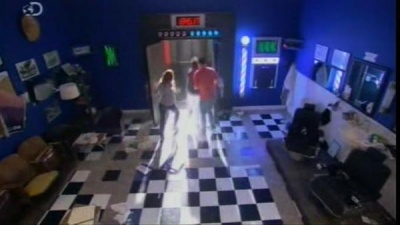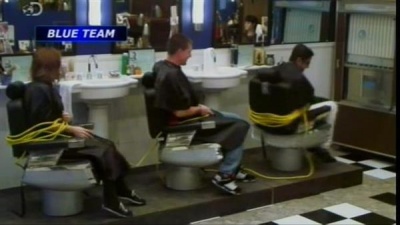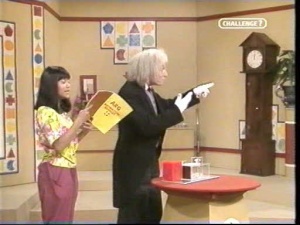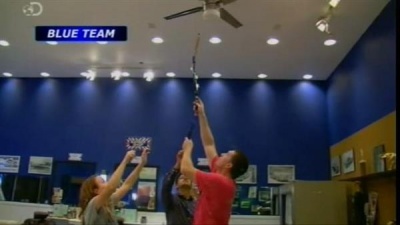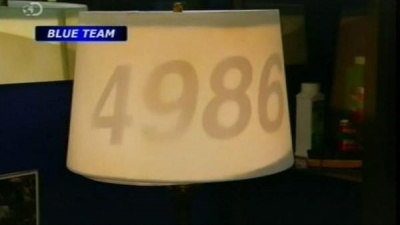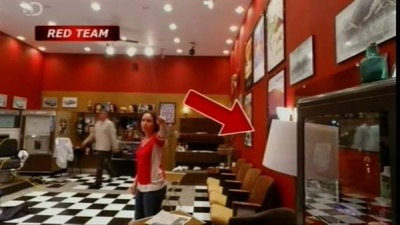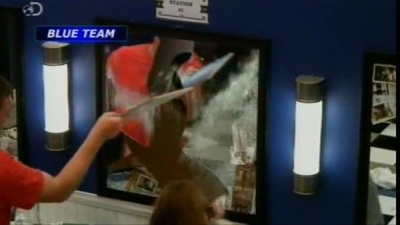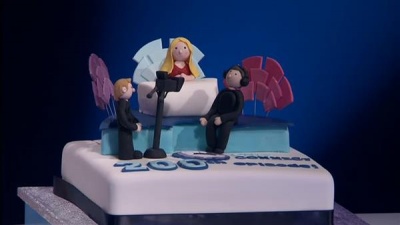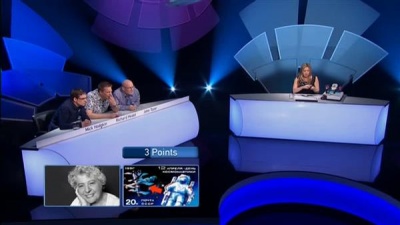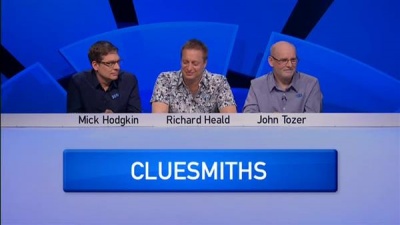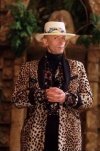Weaver's Week 2016-01-10
(Created page with 'The Week of the Year 2015 | Weaver's Week Index | Next week "Only smart people may pass" This week's…')
Newer edit →
Revision as of 09:57, 10 January 2016
The Week of the Year 2015 | Weaver's Week Index | Next week
"Only smart people may pass"
This week's review contains slight spoilers for episodes yet to air in the UK.
Contents |
Race to Escape
Entertainment One, showing on Discovery Channel, from 1 January
A group of three people are trapped in an alien environment. They will face tests of wit, logic, and perspicacity. Should they fall short, it's a very long walk home.
Race to Escape comes from over the pond, where it went out on Science, previously Science Channel, and before that Discovery Science. And before that it was Quark!, a top (if strange) choice. The show goes out in the UK on the parent Discovery Channel.
The rulebook states that teams have one hour to get out of the rooms. To get out of the rooms, they must defeat five locks by typing in the correct codes. In practice, the show is finished in about 50 minutes of filming, edited to 40 minutes of actual screen time.
With this being a Yankee channel, there's a cash prize on offer. $25,000, but the winning team would need to finish all five puzzles inside 20 minutes to claim that jackpot. A successful trio will rarely win more than a small fraction of that. This is known as "Unwinnable by Design", where audiences are misled by a large prize that cannot be won.
So the team has to do something to earn their escape. But where does the race come in? Simple: the team is not on its own. A second team is taking the same challenges, in an identical room. Only the first team to open all five locks can win cash.
The rooms are identical. Both have the same items in the same places. Junk and trinkets may help, or may confuse. This isn't the stark artificial world of The Adventure Game, it's a fully-realised hair salon, or Chinese restaurant, or schoolroom. A proper reality television mansion, all in one confined space.
There is one subtle difference between the two rooms: one room is red (paint on the wall, some fixtures and fittings), the other is blue. Designers call this "Colour-Coded For Your Convenience", it cues viewers into the differences while emphasising the similarities.
Each episode begins with the players locked up – in handcuffs, or tied to a chair, or shackled to the ground. Between them, they have enough wiggle room to locate the first key, and move it to the padlock.
For British viewers, the first episode was set in a barber's shop. The players – all strangers – were handcuffed and restrained to three barber's chairs by tying electric flex around their bodies. The idea is that the players spin in sequence, so that the cord gets transferred from one end to the other, freeing the first player to unlock them all.
Once freed, the players can rise from the chairs, and take off their barber's smocks. Written in the smocks are some letters – an L, an A, and an MP. Connecting the electric flex to the device concealed by this cunning anagram would reveal the first code.
But the team wasn't following the script. One of them slipped out from beneath their bonds. "This is a bad move," claimed host Jimmy Pardo. No evidence was provided to back his assertion. Critics call this "Producer-imposed reality": there's no reason why it should be bad for someone to wiggle out early. It doesn't break the puzzle, it's not going to hamper the others' efforts.
According to the narrative, Pardo is in a small chamber between the two competition rooms. He has graphics and footage to show where the teams are, and will give partial explanations of events – what's meant to happen, what the teams have overlooked. Footage from the teams should complete the explanation.
But there's a problem: many of the explanations are superficial, and some are left incomplete. We needed a demonstration of how the cables went around the barber's chairs, and we certainly needed a better explanation of how players were meant to get out. Often, the camera angles are not good enough. In a later show, we'll see players rubbing chalk onto a pool table, but we don't get a clear shot of what happens when they do.
A dragon would find many examples of "They explained things better on Arg". The Adventure Game would always give a clear and succinct explanation – it's part of the learning process for the viewers. Too often, Race to Escape is vague, imprecise, or outright misleading. Not only is this unfair to the players, it's unfair to the puzzle designers: a decent idea is tossed away through poor television production.
To unlock part of the solution, the players type in a code to a keypad. The codes are always four digits. The codes are obvious and not ambiguous. They don't need the players to count an arbitrary thing in any nebulous fashion. From time to time, the answers may be derived – songs in a jukebox have numbers, that kind of thing. Always, the answers are clear and precise and obvious when seen.
It can immediately be noticed that the players have not been told this. "Count the number of crimps in the cable." "Spell out L-A-M-P like it's a phone keypad." "Type in the numbers beneath the optics."
This must be a design decision, to force a new rule. Three wrong entries in a row – no matter how much time between them – will cause the keypad to lock for two minutes. And that will cost the team $1000. And, for editorial reasons, this has to happen on every episode.
We would have no complaint if players were briefed properly. But the briefing is insufficient, and we must assume that this is deliberate. It's distracting, it's frustrating, and it's entirely artificial. Snarkers call this a "Scrappy Rule", after the much-loathed nephew of Scooby-Doo.
A side-effect of this: teams cannot short-circuit the intended route. The codes are sometimes hidden in drawers, or the lining of clothes, or in a place where the team might stumble upon them. Even if they find the code by accident, it won't work. This feels a bit arbitrary – massive amounts of luck is a valid way to win. Remember The Murder Game?
Should a team feel that they are stuck on a particular puzzle, they can opt to take a "Codebreaker". This won't reveal the answer, but it will give a list of the steps they need to take to get the answer. Using one of these hints will advance the clock by ten minutes, costing $5000.
In each challenge, the Law of Conservation of Detail applies. When provided with six pieces of snooker cue chalk, the solution expects to use all six pieces of cue chalk. When provided with an electrical cord, the solution expects to use an electrical cord, perhaps by plugging something in. If there is a gun and a picture of Mr. Chekhov from Star Trip, the solution will use both.
There are red herrings in the Race to Escape environment, some elements are not used in any part of the solution. It isn't as airtight as The Hunger Games, books made cloying and dreary because every detail foreshadows some future point. The ice-maker might just make ice. The inkwells may just contain ink. The lampshade may just be decoration.
Because this is a science programme, the producers put in some science-ish content. Almost without exception, the science is Jimmy Pardo delivering pieces to camera about what we've just seen. Almost without exception, he's talking about various sorts of cognitive biases. Gives a fancy-dandy name, and explains how this bias is hurting the team's progress. Viewers call this a "very special episode moment", a piece of educational information pushed into an entertainment programme.
From time to time, the action stops so that Pardo can deliver his definition, and assert that it's an error the player is making right now. When it resumes, the player continues his original action, sure that this is how to solve the puzzle. Has the player heard an OK from the production staff? Were we misled by Pardo's science-burst? Logicians call this "confirmation bias": start with the point you want to make, and then cherry-pick evidence to support it.
Whatever the rights and wrongs, the science babble quickly becomes more annoying than enlightening. It's also something ripe for parody. Humorists would refer to this as a "self-fulfilling joke", and suggest that we were "lampshading".
Eventually, one of the teams will finish all five parts to the puzzle and make their way out of the room, where they might have won a few hundred dollars each. There is no messing about on Race to Escape, the contest begins within a minute of the start, and the post-show debrief happens over the closing credits.
Other than a very brief introductory piece, we only ever see the teams in the rooms. This is a welcome change from the North American norm, where the plot advances through pieces recorded later. Pardo is the omniscient narrator, he carries the plot, the players play.
"It is illegal to hit your opponent with an axe"
Race to Escape uses many ideas found in escape rooms. These attractions began in Japan, and have since spread throughout the world. Hungary is a particular hive of activity, and there is now at least one escape room in most major towns of the UK. The lead guide for escape rooms is Exit Games UK, run by Chris Dickson (who also founded the UKGameshows page back in the last century).
These rooms are also rich in detail, objects to find and cyphers to crack. You might manipulate mirrors to guide a laser beam, or bang drums in a particular sequence, or follow logical steps to orient rings. Some of these don't make for compelling television, and we understand why Race to Escape doesn't use them.
There is one thing they get to do on Race to Escape and not in real escape rooms. That's to break the walls. It would not be usual practice to shave the head of a dummy, or to smash a mirror. Such destruction is fine on television, but not in a tourist attraction where another team will be playing in less than an hour.
We enjoyed watching Race to Escape. The presentation could be better, but the challenges are of a good quality. A show we might go in for? Maybe.
But there's one thing left hanging. An electric flex. A lamp. What you've got to do when time is up is have the host go into the room, and explain it to them. Electric flex. Lamp. The one right by the arrows. Plug it in. This gives the first code, type that in, and perhaps someone might be a winner. Even you three.
Only Connect
Semi-final 1: Cluesmiths v String Section
The 200th transmitted edition of Only Connect this week (but only the 198th day, because Wall Nights were two episodes). Returning the compliment paid on The Great British Bake Off last year, Victoria has a cake on the desk by her. Jolly nice it looks, too, lots of frosting and a miniature of herself and two supplicants on the top.
The Cluesmiths defeated the Railwaymen, Mixologists, and Polyglots, but lost their second match to the Yorkers (who we'll see next week). String Section haven't yet lost; they beat Scientists, Wayfarers (who we'll see next week) and Headliners. To avoid two re-matches in the semi-finals, the split between top and bottom halves of the draw has been removed here.
There might have been a party in the studio, the difficult questions had come out to play. Rules of Dogme 95? Songs with translations of "Little" in the title? Pointless. The Cluesmiths pick up two on names in Bob Dylan songs. Victoria has had three small slices of cake.
Translations of Italian renaissance painters into English? Pictures of things whose names mean "peace"? No score. String Section take a point on overlapping pairs of names ("SweDEN" into "DENmark", but disguised). Cluesmiths lead 2-1, Victoria's had a full corner of cake.
The luck is not with String Section in the early sequences. They know the link is "The elements" song, but don't recall the symbol for rhenium. They know the link is things that halve each time, but give 20 when they meant 21. Cluesmiths pick the latter for a bonus.
Luck redresses a little later, when there's an accidental sequence of Bible quotations. The setters intended the shortest verses in the New Testament, which are 17, 16, 15, and 9 letters. String Section offer "In the beginning", 14 letters also fits the pattern. Two unplanned points, and the floodgates open. Cluesmiths smash pictures of Henry VIII's wives for three, String Section grab two on singers with alliterative names.
We're concerned that Victoria is waving a cake knife while conducting the Desmond Dekker Memorial Choir. Oh, oh, me ears are alight. 6-5 to Cluesmiths.
To the walls, where String Section score four. They're not Ivy League colleges, but the Seven Sisters – the traditional women's equivalent of high learning. Family names of noble 19th century prime ministers evade them. Two groups – wine-tasting and the head – remain scrambled, so four points. Cluesmiths scored seven. They got televangelists, anagrams of British invaders, and screwdrivers, but didn't recognise four classical record labels.
Leading 13-9 into Missing Vowels, Cluesmiths only need to keep their head. UK number one acts of the present decade, a draw. Islands of Japan, a draw. String Section pick up an error in each category. But they know their Italian football teams, spotting 3 of the answers while Cluesmiths get an error of their own. It's a draw, 14-14.
A draw is no good on Only Connect. The principle of a knockout tournament is that one of the teams is knocked out, there has to be a team to advance. The captain's tie-break – one final missing vowels question – goes to String Section.
Countdown Update
A new Championship of Champions event began this week. Tom Cappleman (summer 2015 champion) beat Glenn Webb (winter 2013, semi-finalist) by 133-115. The differences were established early, as Glenn offered an invalid word and was beaten on Tom's selection of numbers. Tom spotted all three nine-letter words, but missed a very gettable numbers round. Tom scored a maximum in 12 of the 15 rounds.
Giles Hutchings (summer 2013 champion) defeated Heather Styles (runner-up in winter 2012) by 132-73. This was a superlative performance; Giles took the lead in the opening round and never looked like letting go. The chance of a maximum game had gone in round 2, but that was the one and only point he dropped all night. 14 maximum rounds shows Giles is going to be back next week.
Andy Platt (summer 2013 runner-up) had a mighty scare from David Barnard (winter 2012, semi-finalist). The letters rounds were a wash, only one produced a clear winner, and David had a 7-point advantage. Tough numbers selections gave one no-score draw, each player got an outright win, Andy's win the opening round would prove to be the difference. Andy solved the conundrum to win the match 98-90, having scored a maximum in just 8 of the rounds.
So close, yet so far away on Thursday. Tracey Mills (summer 2015 runner-up) declared "iodcrase" and "servuga" when she meant "idocrase" and "sevruga". Of course. Dylan Taylor (winter 2013 runner-up) knew both of these, and won three other rounds. A score of 120-73 doesn't tell how well Tracey played, slips of the tongue from staying close. But when Dylan's in 13-max territory, who can beat him? (Find out later in the series, perhaps.)
Friday's episode went out in stereo sound. If you missed George Ford (semi-finalist, winter 2014) declaring a word, just wait a moment and Jen Steadman (quarter-finalist, winter 2013) will repeat it for you. Billed as a numbers genius, George first fell behind in a numbers round; he was also beaten in one letters game. Jen won the match by 126-99, a game played in tremendous spirit between two fine players.
More of this next week, when we meet the final six players in the tournament.
This Week and Next
Do you want to heckle at complete strangers? Tell them to turn the lamp on, or press the U3 button? The Crystal Maze Live is hiring maze-masters. You don't need to have written a hit West End musical.
You have an opinion about game shows. Of course you do. Were there any good or bad ones last year? The Poll of the Year 2015 is open, but only until Wednesday evening. Without your vote, Flockstars might win absolutely everything.
Four weeks ago, Louisa Johnson won The X Factor. This week, her "hit" single has been and gone, never climbing above number 8 on the CBBC / Radio 1 list. The highest charting song from a telly singing show last year? Stevie McCrorie from The Voice UK, who spent a week at number 6. Stevie's new album, "Big World", is out now.
With BBC3 due to close next month, there's a question about where the BBC will show the Eurovision Song Contest semi-finals. They'll go out on 10 and 12 May. The Young Musician of the Year contest will take place in the same week, leading to a final on 15 May. We don't think that Young Musician is a movable feast, concert hall bookings are not cheap. From the assumption that Young Musician heats will be on The Fourth Programme, is Eurovision more likely to be on BBC2?
The UK's Best Part-time Band is moseying its way to BBC4 and BBC2 in May. Somewhere between a documentary and a talent show, it looks at people who play in pubs and clubs. The panel will be Midge Ure ("Vienna" singer), Peter Hook (Hacienda owner), and Jazzie B ("Back 2 Life" host), with Rhod Gilbert fronting. The producers' challenge: represent women in some way.
Channel 4 has bought up the Aussie show My Kitchen Rules. Steve Jones (2) will host, and it'll air for an hour each day for six weeks. In the programme, pairs of cooks create a one-off restaurant in their own homes. Viewers might remember that the show has already had a UK edition, a series in 2014 on UK Living was not renewed for (er) reasons.
Broadcast magazine spoke to Alan Tyler of the BBC about what's going to replace The Voice when it ends in the spring. Mr. Tyler seeks "warm and inclusive formats", with "likeable contestants", which sounds like what we've already got. He also noted:
- "The truth is, if the history of entertainment shows you anything, it's that the territory you believe is not going to be the next big thing is sure to be the next big thing."
Let's meet the teams.
Quiz Update
By no means a classic episode of University Challenge. St Catherine's Cambridge always looked to have the beating of Nottingham, and triumphed by 210-120.
Very difficult to say that this week's Mastermind was a classic, either. Sarah Greenan won the programme, with 13 on AE Housman. None of this week's contenders – Robin Armstrong, Des Gallagher and Matthew Smith – were able to put together a string of general knowledge answers, each preferred a string of passes. 19 points and 6 passes is the lowest winning score under the current arrangements.
BARB ratings are in for the last two weeks of 2015.
Week of 20 December: 12.45m saw the Strictly Come Dancing final, and 315,000 the Red Button coverage afterwards. 7.4m for semi-finals of The Apprentice – the final dropped almost a million viewers. Pointless Celebrities grabbed 5m viewers, Masterchef The Professionals had 3.5m. ITV's lead was The Chase (2.95m) and Catchphrase on ITV2 topped the non-PSB channels (535,000).
And for Christmas week, Mrs Brown's Boys was most popular overall with 9.5m viewers. (Downton Abbey? Loses because we don't combine ITV-SD and ITV-HD. Neither does ITV.) Christmas Night Strictly consolidated to 8.55m. Masterchef The Professionals had 3.8m for finals week, and The Big Fat Quiz of the Year brought 3.3m to Channel 4. World's Strongest Man was seen by 1.35m on C5, and top non-PSB game show was 8 Out of 10 Cats Does Countdown, 365,000 on More4. Goodbye to Extreme Sports, which closed without warning at the end of 2015; the loss of Mantracker will disappoint all 15,000 viewers.
The tone is raised by Brain of Britain 2016 (Radio 4, Mon), and lowered again by Britain's Next Top Model (Lifetime, Thu). Want to send it to Room 101? That's back as well (BBC1, Thu).
Dragons' Den resumes (BBC2, Sun), Big Brother continues (C5, all week), and Josie Gibson pops up on Celebrity Dinner Date (ITVBe, Wed). Challenge has new-to-the-channel editions of Blockbusters and Robot Wars (weekdays). We're not sure about All Hail the Veil (E4, Mon-Wed).
Next Saturday, health and fitness on Pointless Celebrities (BBC1), and Dermot O'Leary drives The Getaway Car (BBC1).
Photo credits: Entertainment One, BBC, Presentable, Chatsworth.
To have Weaver's Week emailed to you on publication day, receive our exclusive TV roundup of the game shows in the week ahead, and chat to other ukgameshows.com readers, sign up to our Yahoo! Group.

